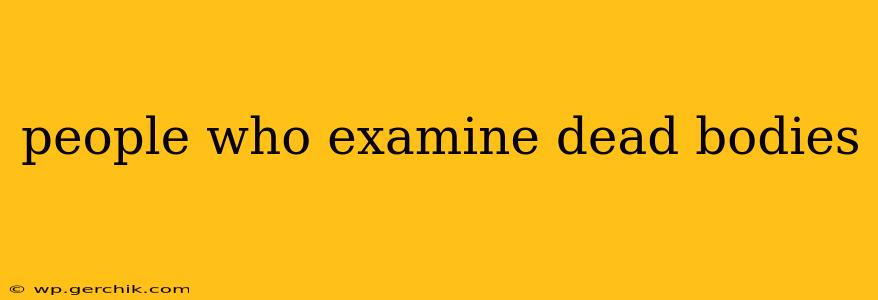The examination of dead bodies is a multifaceted field, encompassing various roles and specializations. While the immediate image conjured might be that of a forensic pathologist, the reality is far richer and involves a team of professionals working together to uncover the circumstances surrounding a death. This comprehensive guide delves into the different professionals involved in examining deceased individuals, clarifying their roles and the critical work they perform.
What are the different types of people who examine dead bodies?
Several types of professionals play crucial roles in the examination of deceased individuals. These roles often overlap, requiring collaboration and expertise from multiple fields. The main players include:
-
Forensic Pathologists: These medical doctors specialize in determining the cause and manner of death through autopsies. They are trained to identify injuries, diseases, and other factors that contributed to death. Their work is crucial for legal investigations and public health initiatives.
-
Coroners and Medical Examiners: While often used interchangeably, there's a distinction. Coroners are typically elected officials who may or may not have a medical background, while medical examiners are always physicians (often forensic pathologists) appointed based on their medical expertise. Both investigate deaths that are sudden, unexpected, violent, or suspicious.
-
Forensic Technicians: These individuals assist forensic pathologists and other investigators during autopsies and crime scene investigations. Their tasks include collecting evidence, photographing the scene, and assisting in the autopsy itself. They play a crucial support role ensuring the meticulous collection of vital data.
-
Anthropologists (Forensic): When dealing with severely decomposed or skeletal remains, forensic anthropologists play a critical role. They can determine age, sex, ancestry, and other identifying characteristics from bones, helping in identifying the deceased and contributing to the investigation.
-
Odontologists (Forensic): Forensic dentists (odontologists) specialize in identifying individuals through dental records. Teeth are highly resistant to decomposition and often provide a unique identifier, even in cases of extensive damage to the body.
What is the job of someone who examines dead bodies?
The job of those examining dead bodies varies widely depending on their specific profession, but the common thread is uncovering the truth behind a death. This often involves:
-
Performing autopsies: This is a detailed examination of the body's internal organs and tissues to determine the cause and manner of death.
-
Collecting evidence: Gathering samples, such as blood, tissue, and other materials, for forensic testing.
-
Analyzing data: Interpreting findings from autopsies, toxicology reports, and other investigations to determine the cause and manner of death.
-
Testifying in court: Presenting their findings and conclusions to the court as expert witnesses.
-
Collaborating with other professionals: Working with law enforcement, crime scene investigators, and other specialists to piece together the events leading up to the death.
What are the different types of death investigations?
Death investigations fall into several categories, each requiring a unique approach:
-
Homicide: Investigations into deaths caused by another person.
-
Suicide: Investigations into self-inflicted deaths.
-
Accident: Investigations into unintentional deaths.
-
Natural causes: Deaths resulting from disease or age.
-
Undetermined: Cases where the cause of death cannot be definitively determined.
How do I become someone who examines dead bodies?
The path to becoming a professional involved in examining dead bodies varies greatly based on the specific role. For example:
-
Forensic Pathologists: Requires a medical degree (MD or DO), followed by specialized training in forensic pathology.
-
Forensic Technicians: Typically requires an associate's or bachelor's degree in a related field, such as forensic science or criminal justice.
-
Forensic Anthropologists: Requires a background in anthropology, often with a graduate degree focusing on forensic anthropology.
-
Forensic Odontologists: Requires a degree in dentistry (DDS or DMD), followed by specialized training in forensic odontology.
This article aims to provide a foundational understanding of the diverse professionals involved in the examination of deceased individuals. The work is challenging, demanding, and requires a strong constitution and dedication to truth-seeking. The various fields highlighted above are all integral to solving mysteries and ensuring justice is served, contributing significantly to the larger legal and medical landscapes.
